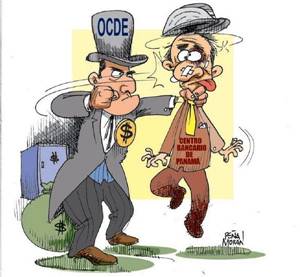Authored by Andrew Quinlan May 25, 2011

CF&P recently released a paper calling on low-tax jurisdictions to resist the OECD. The high-tax European welfare states which control the OECD continue to move the goal posts and devise ever more hoops through which low-tax jurisdictions are expected to jump. As such, it becomes increasingly important for these nations to draw a line in the sand while they still have some fiscal sovereignty left to defend.
Dr. Eduardo Morgan Jr., former Ambassador of the Republic of Panama to the U.S., has recently done just that as he pushes for Panama to confront the OECD directly. In a March letter, Dr. Morgan slams the OECD’s Director of the Centre for Tax Policy and Administration, Jeffrey Owens, for his hypocrisy in ignoring the fact that the U.S. employs many of the policies which the OECD has deemed unacceptable when practiced by smaller jurisdictions.
The letter explains:
Fiscal law is an inalienable part of a country’s sovereignty, and nations worldwide rely on their economic policy and fiscal sovereignty to promote exports and attract foreign direct investment in favor of the welfare of their citizens. Perhaps no other country in the world has these concepts more deeply ingrained in their culture than the U.S., thus becoming the international standard and benchmark for worldwide best practices. In fact, nations throughout the world, small and large, are competing for the same financial resources and tax policy is very much a part of the competitive global business environment. To maintain balance between competitiveness and national interests, countries necessarily rely on international relations, double tax treaties and domestic laws that deal with the extraterritorial aspects of a country’s taxation.
…The U.S. promotes fiscal competition and the right to privacy of individuals as a key developmental factor for protection from abusive tax regimes. If this is the case, and if all the OECD main members share this same philosophy, the true international standard ought to be one of fiscal competition and private individual rights. Therefore, there can be no other interpretation to the “transparency and effective exchange of information”, than being a poor excuse which seeks to eliminate the competition that small countries might pose to the OECD’s cartel members. There is no place for double standards in a global economy. In this context, to consider “transparency and effective exchange of information” as an “international standard” regulating fiscal matters is not only another one of the OECD’s inventions; it is also a chimera.
Dr. Morgan also made a similar point in a recent article (original article is in Spanish, but an English copy is available here) titled “Unmasking the OECD”:
Open war against financial competition began in 1998 with the publication of “Harmful Tax Competition-A Global Problem.” In this document they define their interpretation of a harmful tax haven, and go as far as considering “perception” as a valid element to identify it. This means that Panama, with none of the characteristics to qualify as a tax haven (our tax laws do not discriminate between national and foreigners) was so because that was the perception of the OECD.
Our government has the opportunity to have Panama removed from the blackmail list of the OECD, as did the small island of Barbados whom forced the nefarious organization to recoil when [it] was threatened with being blacklisted…
…[O]n March 2, 25 of Florida’s Congressmen wrote President Obama urging him not to approve the IRS proposedregulations by which the banks must provide information on foreign deposits, to their respective countries. Later on, one of Florida´s Senators, and two Senators of the State of Texas, joined in the request.
That letter, made public, should be used by our government to reproach the OECD, and as Barbados did, to ask to be immediately removed from its gray list and to remove all negative information against our country in the “cackled” Global Forum (another one of the instruments used by the cartel to eliminate competitors).
The Center for Freedom and Prosperity, which opposes the IRS regulation cited by Dr. Morgan, agrees that OECD policies should be applied equally, and also that the best international standard is one that promotes tax competition while respecting financial privacy and fiscal sovereignty.
This is why CF&P is sending two representatives to the upcoming Global Forum in Bermuda. There they will meet with low-tax jurisdictions and discuss strategies for resisting the OECD’s anti-tax competition agenda.

Leave a Reply
You must be logged in to post a comment.